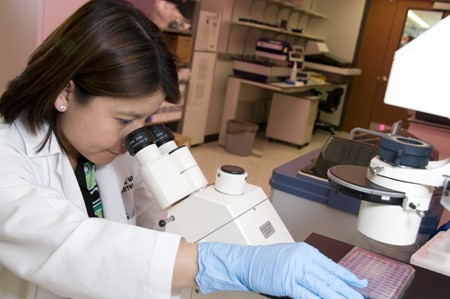Basic Science
Chronic rhinosinusitis describes an inflammation of the lining of the nasal and sinus cavities causing symptoms of nasal congestion, facial pain and pressure, and nasal drainage which can significantly affect a patients quality of life. Disturbances in smell and taste and sleep are two of the most common issues and translates into more than $6 billion spent on direct health care cost annually.
Our lab is focused on various environmental triggers including a fungi which is commonly found in the environment, especially in the southern US. We have identified disruptions in the immune response leading to types of chronic rhinosinusitis. Focused on the molecular pathways leading to the chronic inflammation associated with chronic rhinosinusitis, our goal is to identify novel therapeutic targets.
Recent Key Publications
Sun H, Damania A, Mair ML, Otukoya E, Li YD, Polsky K, Zeng Y, Alt JA, Citardi MJ, Corry DB, Luong AU*, Knight JM*. STAT6 Blockade Abrogates Aspergillus – Induced Eosinophilic Chronic Rhinosinusitis and Asthma, A Model of Unified Airway Disease. Front Immunol. 2022 Feb 23;13:818017. *Co-senior authors, PMID: 35281012
Challapalli SD, McKee S, and Luong AU. The role of fungus in the pathogenesis of chronic rhinosinusitis. Curr Opin Otolaryngol Head Neck Surg. 2022;30(1):58-62.
Tyler MA, Lam K, Marino MJ, Yao WC, Schmale I, Yao WC, Citardi MJ, and Luong AU. Revisiting the Controversy: The Role of Fungi in Chronic Rhinosinusitis. Int Forum Allergy Rhinol., 2021 Nov;11(11):1577-1587. PMID: 34076362
Dietz CJ, Sun H, Yao WC, Citardi MJ, Corry DB, and Luong AU. Aspergillus fumigatus induction of IL-33 expression in Chronic Rhinosinusitis is PAR2-dependent. Laryngoscope, 2019 Oct;129(10):2230-2235. PMID 30973971
